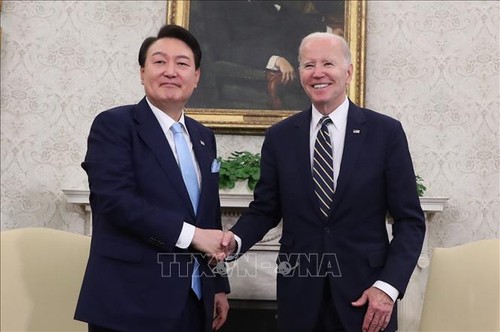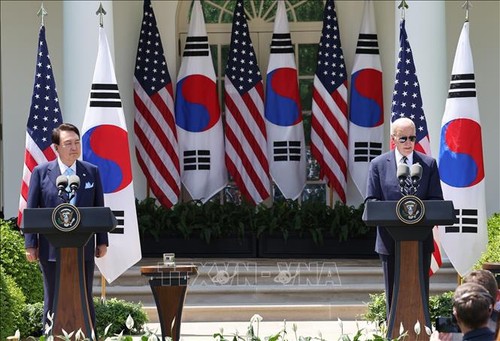 The Republic of Korea’s President Yoon Suk Yeol and US President Joe Biden (Photo: Yonhap/VNA) The Republic of Korea’s President Yoon Suk Yeol and US President Joe Biden (Photo: Yonhap/VNA) |
This is the first state visit by an RoK President to the United States in 12 years and the sixth time that the two Presidents have met over the past year. This shows the close and warm relationship between Seoul and Washington, which the leaders of the two countries acknowledged as "the most successful alliance in history and a valuable alliance".
Mentioning nuclear deterrence for first time
The joint statement emphasizes that the US-RoK relationship, which began as a security partnership, has expanded to a global alliance, enriching economic cooperation and promoting technological progress.
In the statement, the two sides commit to strengthening bilateral security, military and economic cooperation, support for foreign investment and people-to-people exchanges, and mitigation of the impacts of climate change, and, for the first time, they discuss nuclear deterrence.
The Washington Joint Statement emphasizes commitments to a strong security cooperation under the US-RoK Mutual Defense Treaty. The RoK fully believes in the US’s extended deterrence commitments and recognizes the importance, necessity, and benefits of long-term dependence on US nuclear deterrence. Washington pledges to consult with Seoul on any potential use of nuclear weapons on the Korean Peninsula.
President Yoon reaffirmed the RoK’s longstanding commitment to its obligations under the Nuclear Non-Proliferation Treaty (NPT) as the foundation of the global nuclear non-proliferation mechanism and to the Agreement on Cooperation in the Use of Nuclear Energy for Peaceful Purposes between the United States and the RoK.
In the statement, the two sides pledge to work closely in making decisions on nuclear deterrence through dialogues and information sharing on nuclear threats to South Korea and the region.
The two leaders agreed to form a new Nuclear Consultant Group (NCG) to strengthen extended deterrence, discuss the planning of nuclear strategies, and manage the threat posed by the Democratic People’s Republic of Korea (DPRK) to the non-proliferation mechanism. Washington will deploy a ballistic missile submarine to South Korea for a show of force, which is the first visit of such a submarine since the 1980s. However, President Biden made it clear that the US will not place nuclear weapons on South Korean territory.
 The Republic of Korea’s President Yoon Suk Yeol and US President Joe Biden at a press conference (Photo: Yonhap/VNA) The Republic of Korea’s President Yoon Suk Yeol and US President Joe Biden at a press conference (Photo: Yonhap/VNA) |
Great victory for US-RoK alliance
According to experts, the Washington Joint Statement is a major victory for the US-RoK alliance, particularly for the RoK, with the discussion of nuclear deterrence with Washington for the first time. More than ever, Pyongyang's threat to Seoul is real, and the US’s commitment to defend against a nuclear-armed North Korea is extremely important now.
The threat goes beyond the Korean Peninsula to include the US, as Pyongyang's intercontinental ballistic missiles are now capable of reaching the US mainland. DPRK leader Kim Jong-un announced last week that the DPRK is preparing to launch a spy satellite into space and is ramping up ballistic missile testing. Meanwhile, a recent survey in South Korea found that nearly 77% of South Koreans think their country needs nuclear weapons.
Over the past few years, the RoK Government has repeatedly expressed its desire to participate in the plan to strengthen deterrence from joint combat plans with the US to sharing information and training on nuclear weapons. However, the US has only provided South Korea a "nuclear umbrella" through general commitments and has not shared the use of nuclear weapons with South Korea, and opposes the idea of South Korea developing nuclear weapons.
Both the US and South Korea pledge to steadfastly pursue dialogue and diplomacy with North Korea without preconditions, but it is feared that the US-RoK Joint Statement may create new tensions that undermine the goal of completely denuclearizing the Korean Peninsula.